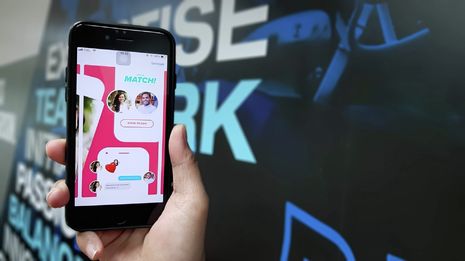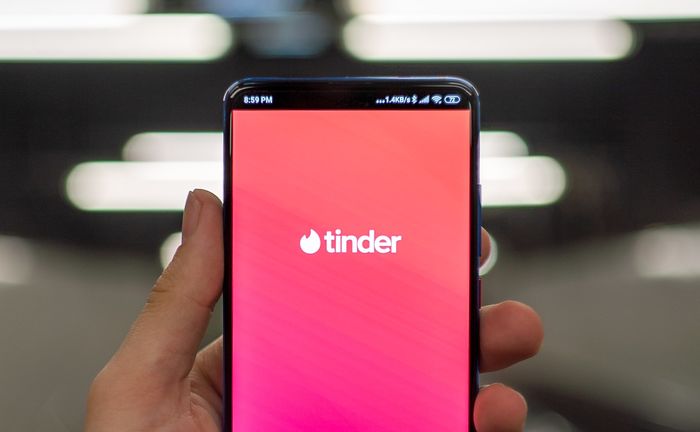Are the ‘dating app dons’ just the tip of the iceberg?
In light of the recent “dating app dons” scandal, columnist Maia Livne explores the negative impacts of Tinder both in Cambridge and in our society as a whole, especially its commodification of human intimacy

Content note: this article contains mentions of spiking, and discussion of rape culture and sexual assault
Can one really have it all? Probably not, especially if all includes both a post at the University of Cambridge and a thriving 18-year-old-seeking Tinder account. Yet where do we draw the line? Some students believe “Academics being on Tinder undermines the trust students place not only in the staff, but in the institution itself”. But, to be fair, academics are allowed to be lonely and desperate, and crossing the lawns may not be so worth it if you have to stomp on those grass blades all by yourself. People have social media accounts - as is their right. They are often criticised for the content they share but that does not mean that once you receive authority over others you are required to dedicate your time to your Goodreads fans alone.
Dons shouldn’t set their age-span to one that overlaps with most students - yet that is not strictly speaking illegal. Some of the teaching staff at Cambridge are fresh out of uni themselves, and if a 25-year-old met a 19-year-old at a bar and hooked up with them, we might not like it but it is not inherently wrong. The main issues arise when you state openly that you are a staff member of the University, or when students state openly that they are students. Especially in a place like Cambridge where one can easily make that assumption about most of the 18-to-22-year-olds.
Sex, love or even friendship are never ten miles away. They are five drinks away, two days of talking away, five-years-three-fights-and-one-cat-away.
While staff should completely be held accountable for that, we should note how the format of Tinder flattens people into flickering photos through which one can swipe quickly, ignoring pieces of information that could less easily be swiped away in a live conversation. And it is way easier to say that you are dom and kinky to your phone screen, ignoring that it will soon be on the screens of many teenagers, than it is to say it out loud. Of course, University staff should be aware of those things and should be held accountable, yet they are part of the larger phenomenon of how Tinder is distorting our sex lives.
Social media has required us to detangle human personality and distil each component, bottling them for commercial use: Twitter-witty, Insta-pretty. Unfortunately, most people are not professionally equipped to be all of those things on all of these platforms, and the way to clout is usually scattered with shattered horrors of cringe. Maintaining your own miniature panorama is a full-time job, as the fact that celebrities pay people to do it for them proves. If Kendall Jenner is not trusted with her own Instagram, why should mediocre 30-year-old men be handed a weapon as deadly as Tinder freely? Not only are people usually more awkward and blunt on social media, it usually doesn’t even work. We are attracted to people who interest us in many layers, and no shirtless-fish-holding picture can generate the same effect. While all online personas deform the personality, sometimes even for the better, Tinder creates the most jarring dissonance by taking the most intimate part of us and demanding we create a calling card for it. People enter Tinder for intimacy, and what is less intimate than an ever-shuffling deck of cards with strangers’ faces on them?
Tinder creates the illusion that intimacy is a product. You don’t necessarily pay, but you browse the catalogue as you flick through Netflix or Deliveroo, believing there must be the perfect entertainment for you somewhere. Much like my high school self, the app does not distinguish between the arts of chemistry and geography. Sex, love or even friendship are never ten miles away. They are five drinks away, two days of talking away, five-years-three-fights-and-one-cat-away. Relationships always get built and the process, even if it lasts a night, is always an essential part of it.
Tinder creates the illusion that intimacy is a product
When we see intimacy as just the obvious outcome, we start seeing sex as something to which we are entitled. And any obstacle - such as meeting the person beforehand, mapping out the circumstances, and even consent – becomes a cumbersome obstacle in the way of a fun night. As we are surrounded by cases of spiking on campus, on college grounds and even on Varsity trips - we have to trace back how people’s approach to sex gets so distorted that the other person’s consciousness is seen as a threat to the main goal. That is absolutely not to say that people who have Tinder support rape culture in any way, but to say that Tinder as an app promotes the idea of sex as an act that is available and detached from organic chemistry and communication.
Tinder has clearly not cured the world’s sex drought, but rather oversaturated it with uncomfortable intimate reveals. It is not surprising that when one goes to the meat market, one sees flesh. So yes, staff faculty should not be matching with students on Tinder; but should any of us be still swiping?
 News / Downing Bar dodges college takeover31 January 2026
News / Downing Bar dodges college takeover31 January 2026 Comment / College rivalry should not become college snobbery30 January 2026
Comment / College rivalry should not become college snobbery30 January 2026 Fashion / A guide to Cambridge’s second-hand scene2 February 2026
Fashion / A guide to Cambridge’s second-hand scene2 February 2026 Lifestyle / Which Cambridge eatery are you?1 February 2026
Lifestyle / Which Cambridge eatery are you?1 February 2026 News / Cambridge for Palestine hosts sit-in at Sidgwick demanding divestment31 January 2026
News / Cambridge for Palestine hosts sit-in at Sidgwick demanding divestment31 January 2026









